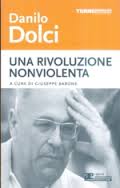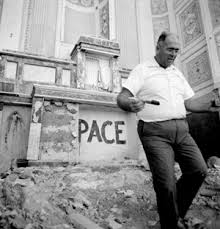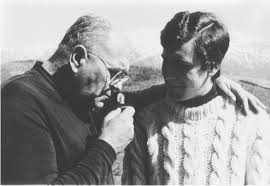Danilo Dolci (28 Jun 1924 – 30 Dec 1997)
BIOGRAPHIES, 24 Jun 2019
EDDILI – TRANSCEND Media Service
Danilo Dolci was born near Trieste, northern Italy in 1924. He was son of a devout Slav mother and a sceptical Italian father who worked for the railways as a station–master. Danilo Dolci originally studied architecture in Rome, Milan, Switzerland, and also trained as an engineer.
As a student he published works on the science of construction and the theory of reinforced concrete. He was hailed as a man with a brilliant future. He was also a deeply devout Catholic.
Instead of immediately embarking on a professional career, he gave up everything to work for a time, with a remarkable priest, Don Zen Saltini, who had opened an orphanage for 3,000 abandoned children after the war.
Danilo Dolci first came to Sicily for the sake of its ancient beauty.
He was especially interested in Greek buildings and he spent time studying the ruins.
In 1954 Danilo settled in western rural Sicily. What kept him in Sicily for the rest of his life and made him give up a professional future was the Island’s present wretchedness. The awful misery of Sicily was a command to him. What he called an “instinct”. Thousands lived in holes in the ground, in slums worse than Calcutta, without electricity, water, sanitation. They lived on the edge of starvation, weighed down by ignorance, illiteracy, superstition, fear, injustice, oppression by the mafia, indifference from the church, plus above all, with the all-pervasive sense of hopelessness for unemployment. He chose Partinico (province of Palermo) in an area notorious for banditry and proverbial poverty. A place where “the flies would not let you open your mouth”. He continuously worked with the farmers and fishermen, exploring their problems. He lived in Trappeto, a slum town near Partinico. He married one of his neighbours, a widow with five children. From their small house, with none of the usual conveniences, he launched his campaign against the misery that surrounded him.
Alone he stood, faced by hostility of the church, the government, the landowners, and the mafia. Surely, only with a flame of faith in his heart he could face hatred, corruption, brutality, indifference, poverty, dereliction and despair. But he did face them and achieved his victories. He lived on the same level of those he was trying to help, working at grassroots level, attempting to leaven the lump with love and knowledge, so that the world may rise up of its own accord. First there was the giant problem of unemployment. Work, Dolci insisted, is not only a right, it is a duty. Inspired by this idea, he organized the famous “strike in reverse” in which 150 jobless men protested by going to work. Dolci and the unemployed began to work on a local road that was badly in need of repair. They were arrested on invented charges and spent 8 months in jail. There was no violence, for Dolci was a disciple of Mahatma Ghandi, plus he believed in a non-violent approach as a matter of principle.
Another big problem was the lack of water and of means to get food. Due to the lack of water the communities were disempowered. “One day in October 1952, I was called into town: a child was ill.
The one-room house was damp and dark. The mother was yellow. The father was in jail for having stolen a few lemons. The mother hadn’t eaten for days, her milk dried up and the child was dying. I ran to the drug store, it was in the next town, and came back with milk. But the child had stopped breathing. We tried to revive him with the milk. No response. He was dead.” Immediately Dolci met a group of friends. They made a radical decision: to go on a hunger strike by turns until the Italian government will grant emergency funds to the town in order to provide for its most basic needs: a pharmacy, sewers, job-training. Dolci begins the hunger strike, and it was agreed that if he dies, others will continue hunger strike in his place until the state responds. Dolci and his friends didn’t act in a vacuum, they notified regional and national authorities and the press of their hunger strike and were thus able to stir up public indignation all over Italy. Yet more important than publicity was peasants’ and fishermen’s awareness that their own existence and dignity were at stake. Regardless of the “public” (which for 21 years had tolerated Fascism and for centuries the Mafia), Sicilians committed themselves to changing their situation through their own initiative.
The first hunger strike ever held in Sicily by choice lasted eight days. Lying in the house of the dead child, Dolci shamed the Italian government into building a pharmacy in Trappeto, paving its streets and constructing a sewer system. Dolci committed himself to working with the communities helping them to express themselves, to have their voices heard in a nonviolent manner. As a result of his tireless campaigning, dams were built, bringing irrigation, energy and new jobs. Never tiring he continued his works, looking at education, protesting against the current state and the barriers to attendance. He persuaded the government to bring new industry from the North, and a new life for the slum. Fearlessly he exposed and faced down the mafia, again being threatened with prison and death. In 1967, when he accused, by name, prominent members of the government of collusion with organised crime, he spent more time in jail for libel. He responded by broadcasting his opinions over a private radio station, which was promptly closed. It still is a source of wonder to local people why the mafia never seriously retaliated against Dolci; the speculation was that he was so popular that mobsters feared mass retaliation.
In the 70s, after consulting with both parents and children, an accessible school was built. Designed with the help of the youngsters, with low windows and other ideas they had, young people were free to enjoy and benefit from education. The school curriculum was also decided by the children, after being asked what they would like to learn about, each day. Even now, this type of education system can be found in the northern part of Italy. Danilo also founded the Study Centre in Partinico, which still remains a source of aid for social and, above all, agricultural projects. He was also a profuse and widely-read writer: his works include poetry and moving interviews with other wise invisible members of humble trades, whose lives he brought into evocative focus. His books are remarkable accounts of the society he surveys, and their accuracy and insights have helped to give a realistic basis for any improvement scheme. Most importantly he has given voice to the abandoned, forgotten and despairing, nameless, suffering people of Sicily. The emphasis is on selfhelp, with minimum official intervention, by radio, the papers, TV and through his books where Sicilian’s poor speak for themselves: an act of non-violent demonstration.
On December 30th, 1997 Danilo Dolci “the Sicilian Ghandi”, winner of the Lenin peace prize (despite being explicitly non-communist), and twice a nominee for the Nobel peace prize, died at the age of seventy-three, of heart failure.
Go to Original – reciprocalmaieutic.danilodolci.it
Tags: Biography
DISCLAIMER: The statements, views and opinions expressed in pieces republished here are solely those of the authors and do not necessarily represent those of TMS. In accordance with title 17 U.S.C. section 107, this material is distributed without profit to those who have expressed a prior interest in receiving the included information for research and educational purposes. TMS has no affiliation whatsoever with the originator of this article nor is TMS endorsed or sponsored by the originator. “GO TO ORIGINAL” links are provided as a convenience to our readers and allow for verification of authenticity. However, as originating pages are often updated by their originating host sites, the versions posted may not match the versions our readers view when clicking the “GO TO ORIGINAL” links. This site contains copyrighted material the use of which has not always been specifically authorized by the copyright owner. We are making such material available in our efforts to advance understanding of environmental, political, human rights, economic, democracy, scientific, and social justice issues, etc. We believe this constitutes a ‘fair use’ of any such copyrighted material as provided for in section 107 of the US Copyright Law. In accordance with Title 17 U.S.C. Section 107, the material on this site is distributed without profit to those who have expressed a prior interest in receiving the included information for research and educational purposes. For more information go to: http://www.law.cornell.edu/uscode/17/107.shtml. If you wish to use copyrighted material from this site for purposes of your own that go beyond ‘fair use’, you must obtain permission from the copyright owner.


